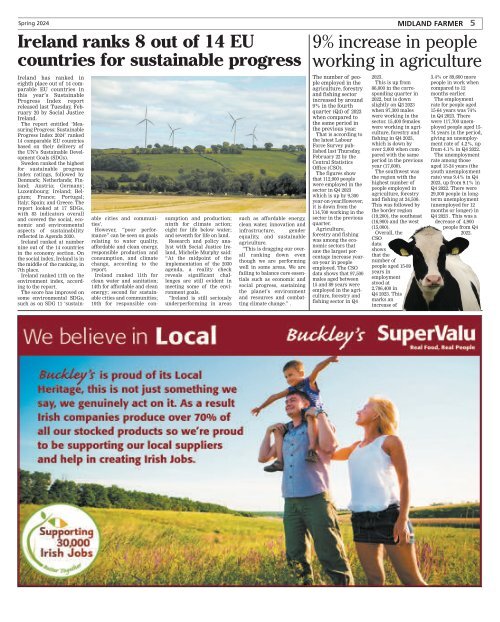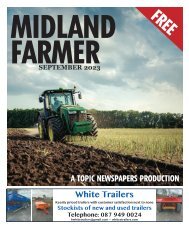Midland Farmer - Spring 2024
You also want an ePaper? Increase the reach of your titles
YUMPU automatically turns print PDFs into web optimized ePapers that Google loves.
<strong>Spring</strong> <strong>2024</strong><br />
Ireland ranks 8 out of 14 EU<br />
countries for sustainable progress<br />
Ireland has ranked in<br />
eighth place out of 14 comparable<br />
EU countries in<br />
this year’s Sustainable<br />
Progress Index report<br />
released last Tuesday, February<br />
20 by Social Justice<br />
Ireland.<br />
The report entitled ‘Measuring<br />
Progress: Sustainable<br />
Progress Index <strong>2024</strong>’ ranked<br />
14 comparable EU countries<br />
based on their delivery of<br />
the UN’s Sustainable Development<br />
Goals (SDGs).<br />
Sweden ranked the highest<br />
for sustainable progress<br />
index ratings, followed by<br />
Denmark; Netherlands; Finland;<br />
Austria; Germany;<br />
Luxembourg; Ireland; Belgium;<br />
France; Portugal;<br />
Italy; Spain; and Greece. The<br />
report looked at 17 SDGs,<br />
with 83 indicators overall<br />
and covered the social, economic<br />
and environmental<br />
aspects of sustainability<br />
reflected in Agenda 2030.<br />
Ireland ranked at number<br />
nine out of the 14 countries<br />
in the economy section. On<br />
the social index, Ireland is in<br />
the middle of the ranking, in<br />
7th place.<br />
Ireland ranked 11th on the<br />
environment index, according<br />
to the report.<br />
The score has improved on<br />
some environmental SDGs,<br />
such as on SDG 11 ‘sustainable<br />
cities and communities’.<br />
However, “poor performance”<br />
can be seen on goals<br />
relating to water quality,<br />
affordable and clean energy,<br />
responsible production and<br />
consumption, and climate<br />
change, according to the<br />
report.<br />
Ireland ranked 11th for<br />
clean water and sanitation;<br />
14th for affordable and clean<br />
energy; second for sustainable<br />
cities and communities;<br />
10th for responsible consumption<br />
and production;<br />
ninth for climate action;<br />
eight for life below water;<br />
and seventh for life on land.<br />
Research and policy analyst<br />
with Social Justice Ireland,<br />
Michelle Murphy said:<br />
“At the midpoint of the<br />
implementation of the 2030<br />
agenda, a reality check<br />
reveals significant challenges<br />
are still evident in<br />
meeting some of the environment<br />
goals.<br />
“Ireland is still seriously<br />
underperforming in areas<br />
such as affordable energy,<br />
clean water, innovation and<br />
infrastructure, gender<br />
equality, and sustainable<br />
agriculture.<br />
“This is dragging our overall<br />
ranking down even<br />
though we are performing<br />
well in some areas. We are<br />
failing to balance core essentials<br />
such as economic and<br />
social progress, sustaining<br />
the planet’s environment<br />
and resources and combatting<br />
climate change.” .<br />
MIDLAND FARMER<br />
9% increase in people<br />
working in agriculture<br />
The number of people<br />
employed in the<br />
agriculture, forestry<br />
and fishing sector<br />
increased by around<br />
9% in the fourth<br />
quarter (Q4) of 2023<br />
when compared to<br />
the same period in<br />
the previous year.<br />
That is according to<br />
the latest Labour<br />
Force Survey published<br />
last Thursday,<br />
February 22 by the<br />
Central Statistics<br />
Office (CSO).<br />
The figures show<br />
that 112,900 people<br />
were employed in the<br />
sector in Q4 2023<br />
which is up by 9,300<br />
year-on-year.However,<br />
it is down from the<br />
114,700 working in the<br />
sector in the previous<br />
quarter.<br />
Agriculture,<br />
forestry and fishing<br />
was among the economic<br />
sectors that<br />
saw the largest percentage<br />
increase yearon-year<br />
in people<br />
employed. The CSO<br />
data shows that 97,500<br />
males aged between<br />
15 and 89 years were<br />
employed in the agriculture,<br />
forestry and<br />
fishing sector in Q4<br />
2023.<br />
This is up from<br />
86,000 in the corresponding<br />
quarter in<br />
2022, but is down<br />
slightly on Q3 2023<br />
when 97,300 males<br />
were working in the<br />
sector. 15,400 females<br />
were working in agriculture,<br />
forestry and<br />
fishing in Q4 2023,<br />
which is down by<br />
over 2,000 when compared<br />
with the same<br />
period in the previous<br />
year (17,600).<br />
The southwest was<br />
the region with the<br />
highest number of<br />
people employed in<br />
agriculture, forestry<br />
and fishing at 24,500.<br />
This was followed by<br />
the border region<br />
(19,200), the southeast<br />
(16,900) and the west<br />
(15,000).<br />
Overall, the<br />
CSO<br />
data<br />
shows<br />
that the<br />
number of<br />
people aged 15-89<br />
years in<br />
employment<br />
stood at<br />
2,706,400 in<br />
Q4 2023. This<br />
marks an<br />
increase of<br />
5<br />
3.4% or 89,600 more<br />
people in work when<br />
compared to 12<br />
months earlier.<br />
The employment<br />
rate for people aged<br />
15-64 years was 74%<br />
in Q4 2023. There<br />
were 117,700 unemployed<br />
people aged 15-<br />
74 years in the period,<br />
giving an unemployment<br />
rate of 4.2%, up<br />
from 4.1% in Q4 2022.<br />
The unemployment<br />
rate among those<br />
aged 15-24 years (the<br />
youth unemployment<br />
rate) was 9.4% in Q4<br />
2023, up from 9.1% in<br />
Q4 2022. There were<br />
29,500 people in longterm<br />
unemployment<br />
(unemployed for 12<br />
months or longer) in<br />
Q4 2023 . This was a<br />
decrease of 4,900<br />
people from Q4<br />
2022.
















